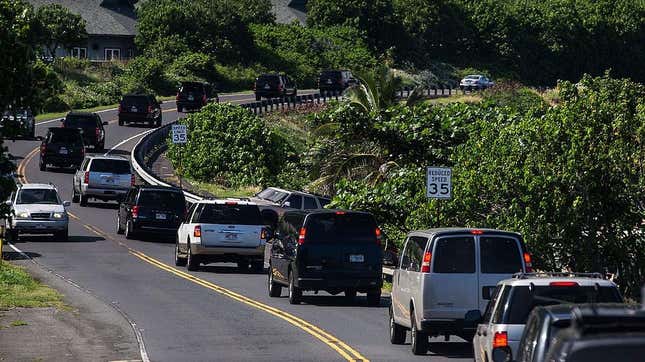
Mesina D. is a 15-year-old from Kailua, Oahu. A few years ago, she visited the shoreline with a relative who pointed several feet into the water. “She said, ‘I used to play volleyball out there,’” Mesina told Earther. “And now it’s just all ocean 20 feet up to where we were.”
Mesina is one 14 young people ranging from the ages of 9 to 18 years old who filed a lawsuit against Hawaii’s state’s transportation department last week, alleging that the agency has violated their constitutional rights to a safe and healthy life in Hawaii.
By filing the lawsuit, Navahine F. v. Hawai‘i Department of Transportation, the young plaintiffs hope to ensure that the HDOT actually takes action to help Hawaii become carbon neutral by 2045.
Andrea Rodgers, an attorney at Our Children’s Trust and one of the lead councils for the case, says that many elected officials in Hawaii want to push for more climate friendly policies, but the Hawaii Department of Transportation (HDOT) has proven to be a weak link in the state’s efforts to lower emissions.
“Not only [is the department encouraging] the leading source of fossil fuel emissions, not only are they refusing to meet goals [of] reducing emissions, but they’re also kind of… roadblocks for passing climate legislation,” she said. A press release from Our Children’s Trust claims that the transit sector is expected to comprise nearly 60% of Hawai‘i’s total greenhouse gas emissions by 2030.

In the complaint, the plaintiffs outline how the climate crisis, which has been caused by sky high greenhouse gas emissions, has personally affected them. For example, Mesina’s family runs a yoga studio out of their home, but had to close the business for about a week last year due to heavy flooding.
Another plaintiff, 14-year-old Taliya N., is a Native Hawaiian resident of Kamuela, Hawaii. Her family lives off the grid and often uses rainwater to do laundry, but recent drought forced her family to restrict water usage. The increased intensity and frequency of storms on the island have also forced Taliya to change her morning schedule.
“We have like these heavy, heavy rains, which floods the roads. And in order for me to go to school, I have to wake up at like four thirty [in the morning] and I leave the house at five,” she told Earther. “When it’s flooding the roads it’s scary… to get out of my home there’s this bridge, and whenever it floods, the water goes over the bridge.”

According to Taliya, it’s in her heritage working to protect the islands and participate in climate action. Native teens involved in the lawsuit also worry that turbulent weather conditions could hurt important spiritual and cultural heritage sites.
“Sea level rise is also actively washing out burial sites along the coast, exposing and scattering ‘iwi kūpuna (ancestral bones) interred in the sands,” the plaintiffs state in their complaint. “Disinterment of ‘iwi by rising sea level inflicts the same emotional harm... as the flooding of a cemetery or any other act of desecration against the dead.”
This lawsuit is one of several that Our Children’s Trust has filed in an attempt to force climate action. In March, the firm helped a group of teens in Utah file Natalie R. v. State of Utah, which alleges that Utah elected officials unconstitutionally favor fossil fuel companies at the expense of residents’ health and safety.
Young activists in other countries have also filed lawsuits. In 2021, Germany’s highest court sided with young activists who challenged a 2019 climate law. In 2020, a Melbourne college student sued the Australian government for failing to disclose climate-related risks to investors looking to purchase government bonds.
In Navahine F. v. Hawaii DOT , the young Hawaii residents want action from the state’s DOT, and feel that they can’t wait until the department decides to take climate action when they’re already feeling the effects of extreme weather and rising tides.
Taliya and Mesina want the lawsuit to go to court so that they can testify and advocate for the chain of islands that they call home. “I realized what I’m doing… but I just haven’t had it hit me where I’m actually like, hopefully [going to] change something,” Taliya said.
“It’ll probably sink in when you’re in the courtroom,” Rodgers added.